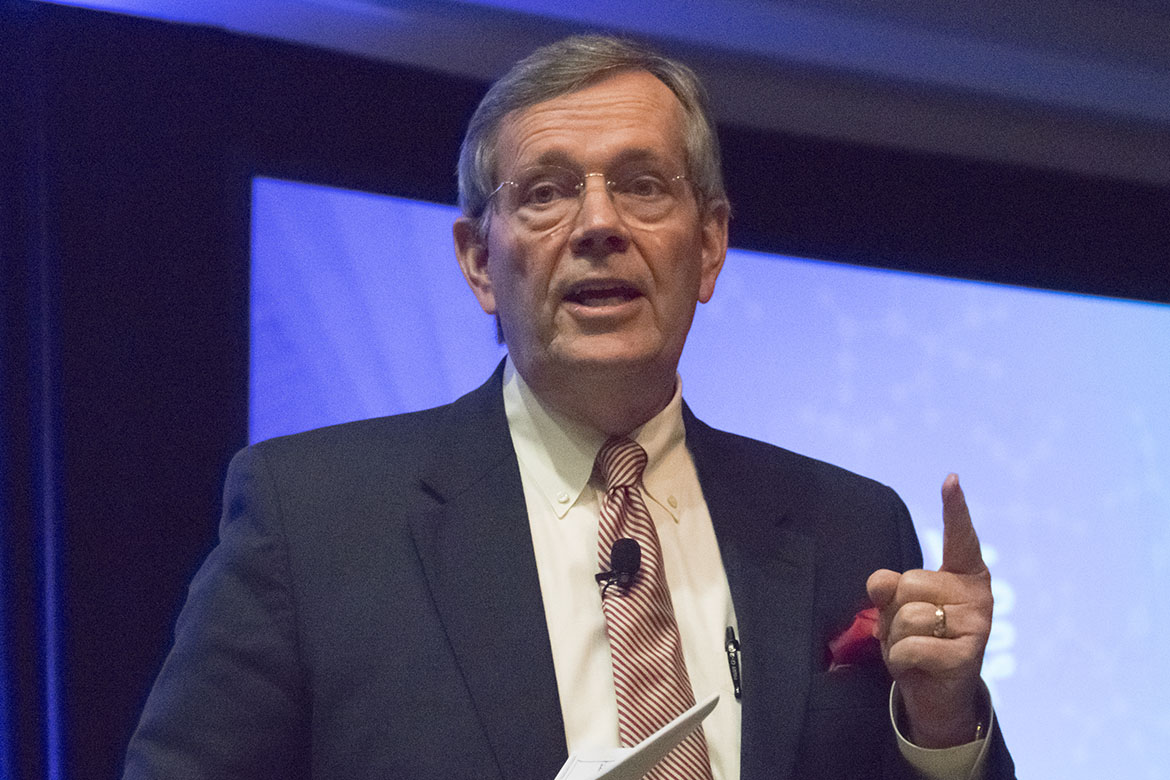With the health care system in the midst of change, a rowdy election behind us and many unknowns still in the air, former Utah governor and Health and Human Services (HHS) Secretary Mike Leavitt detailed the true nature of this transformation and why physicians need to lead the way.
Leavitt, who spoke last week at the AMA State Legislative Strategy Conference in Amelia Island, Fla., engaged in a conversation with physicians in attendance. After Leavitt briefly speculated on the possible upcoming repeal—hopefully paired with a replacement—of the Affordable Care Act (ACA), physicians did not hesitate to jump in with their concerns about the impact such actions could have on the payment system transformation that is well underway with the new Quality Payment Program (QPP). And Leavitt offered a broader perspective of health system change.
Medicine, business or both?
The repeal of the flawed Sustainable Growth Rate formula through the passage of the Medicare Access and CHIP Reauthorization Act (MACRA), the latest development in health care transformation, was a physician-led effort toward a more efficient health care system.
“We have found our way into a new kind of payment model that is the result of what we have learned over the last 15 or 20 years,” he said. But it’s not perfect, he added, and we are not very good at it yet.
The transition from fee-for-service payment will continue implementation regardless of what happens in the next few months. “The reason that MACRA passed the Congress with bipartisan votes is that it has broad-based bipartisan support,” Leavitt said. He sees the full-scale transformation of the health care system as being based on three questions: “Who matters? Who pays? And who gets to decide?” Which is the reason why organizations like the AMA have to be in the debate, he said.
Looking to his time as HHS secretary, Leavitt explained the two voices he would hear in the debate. “The first was the CFO of a business who would say to me, ‘My CEO’s hair is on fire. He’s saying to me if we can’t find a way to get health care costs down we will no longer be a competitor. And we’ve got to find something to measure. I don’t care if it’s perfect, but turn the MBAs [loose] on how to get this done.’”
“The second voice I would hear would be from the physician who would say, ‘I’m all for quality. I’m all for the fact that we’ve got to do this better. But if you’re going to grade me as a physician, you better get this right. Because if you’re not, you’re doing my patient a grave disservice and you’re being unfair to me.’”
Listening to both sides of the conversation as secretary, Leavitt said the question that remained was simple: Will the MBAs be running it or will the MDs?
“One way or another, payers are going to drive change,” Leavitt said, “and your voice needs to be there.”
A friend of Leavitt’s had a son in medical school. He said his son wants to be a family physician.
“Is that a good idea?” Leavitt was asked. “You know the truth is, in the long run, I think that’s a good idea, but I’d like to make a suggestion. Tell your son to learn how to manage as well as practice medicine because that’s the role of the future physician.”
“I believe that we are beginning to see people do very hard things,” Leavitt said. “We are seeing people merge and begin to unify and work together [who] would rather be independent. That’s a hard thing.”
“We have to find a way for the small, independent practice to play here,” he said. “I believe we’re talking about a need for real change, and when it comes to real change we only have three options.” One is to fight it and die.” A second is to be “overcome by events.” The third is “you can lead it and prosper.”
That’s what the AMA, state medical societies and individual physicians’ imperative should be, Leavitt said. “It is not to disengage. It is to engage. It is not to turn it over to MBAs alone. It is to work collaboratively.”




